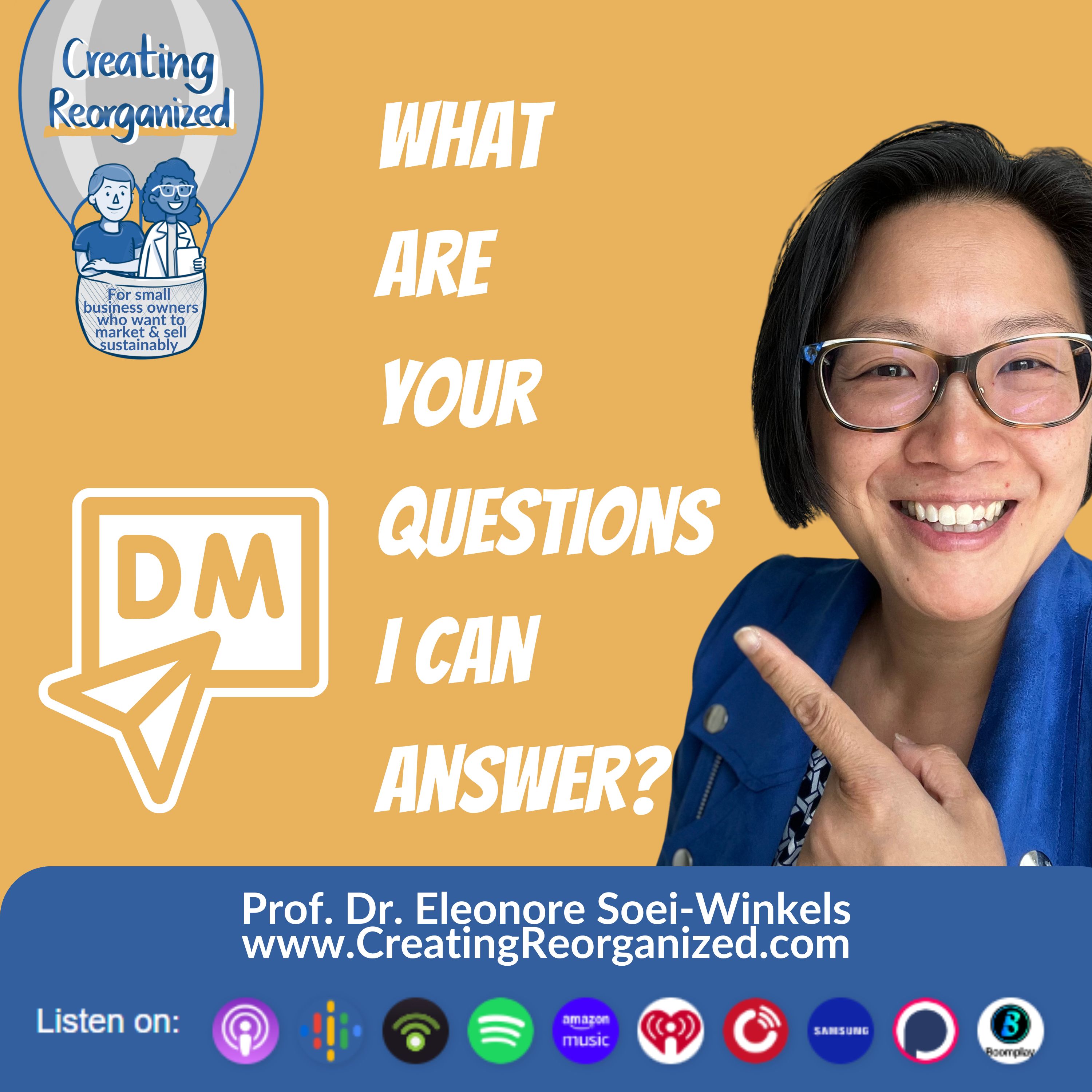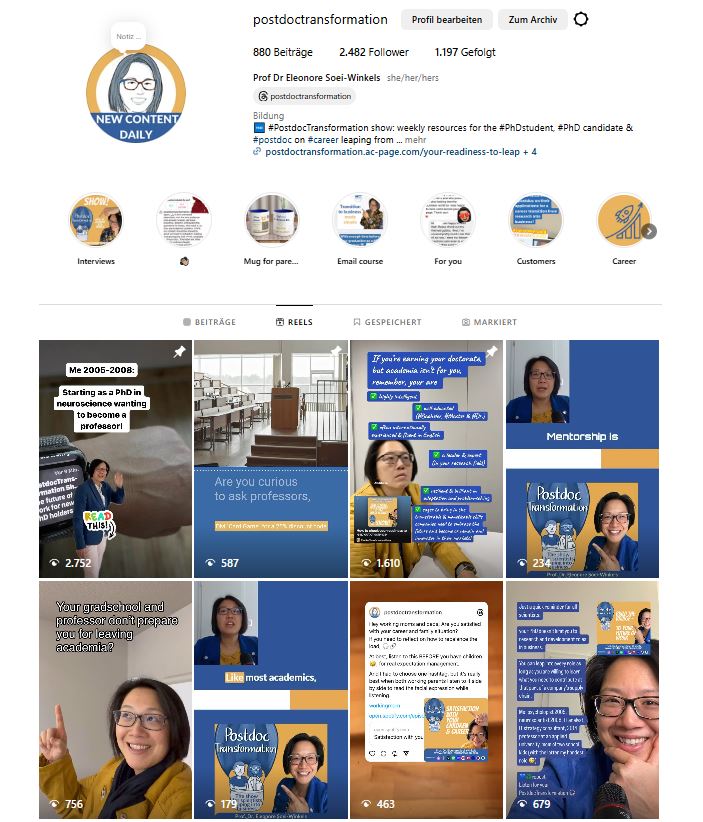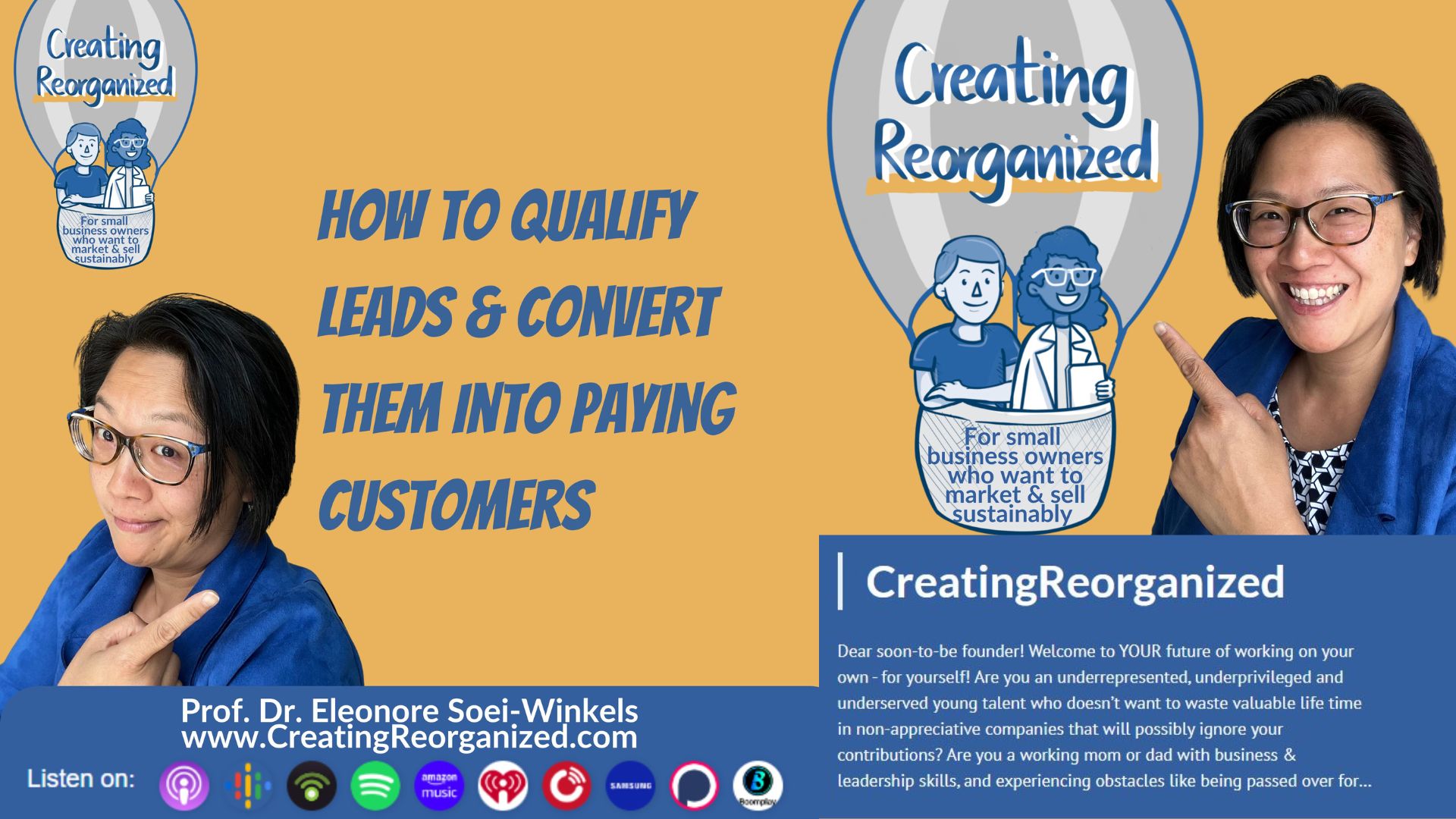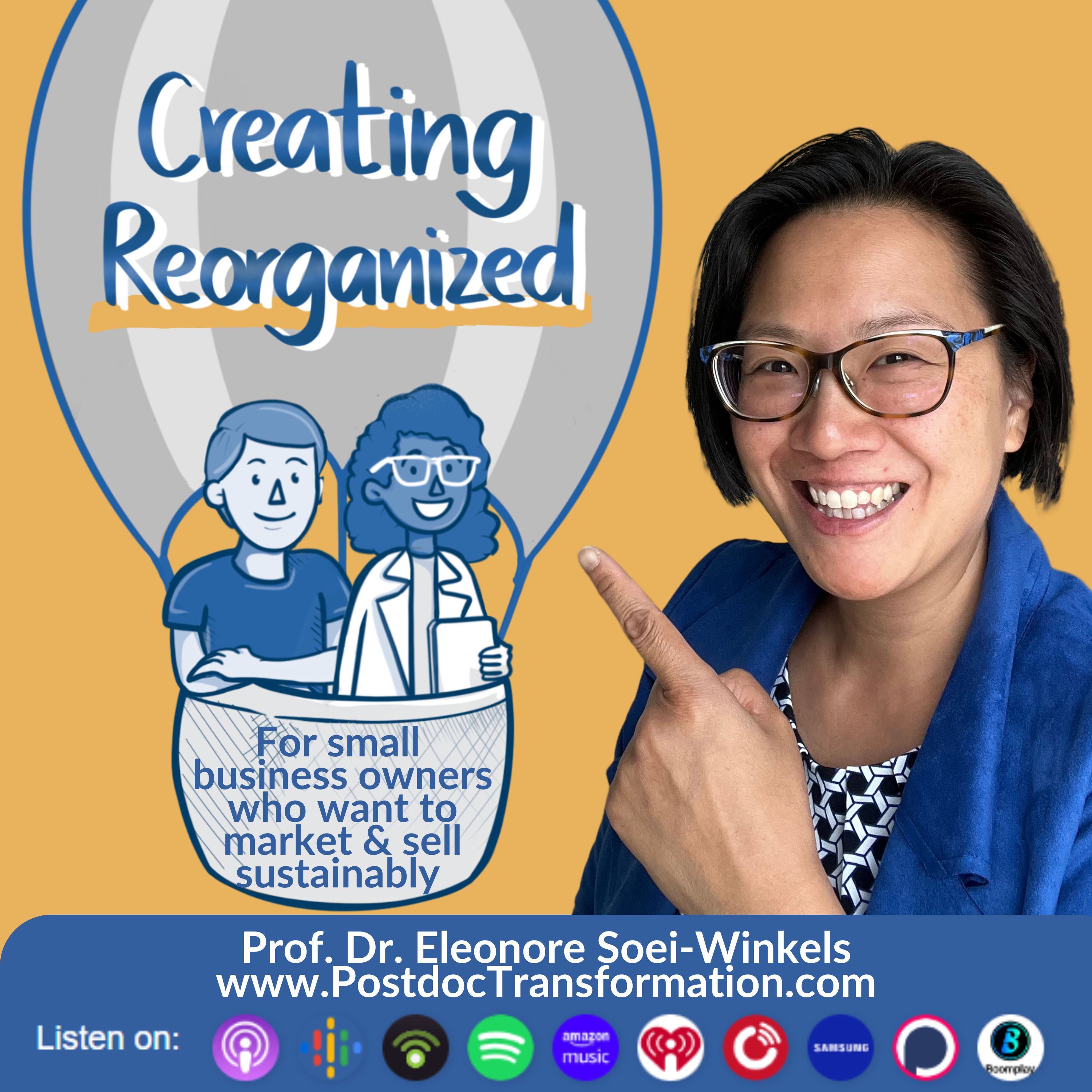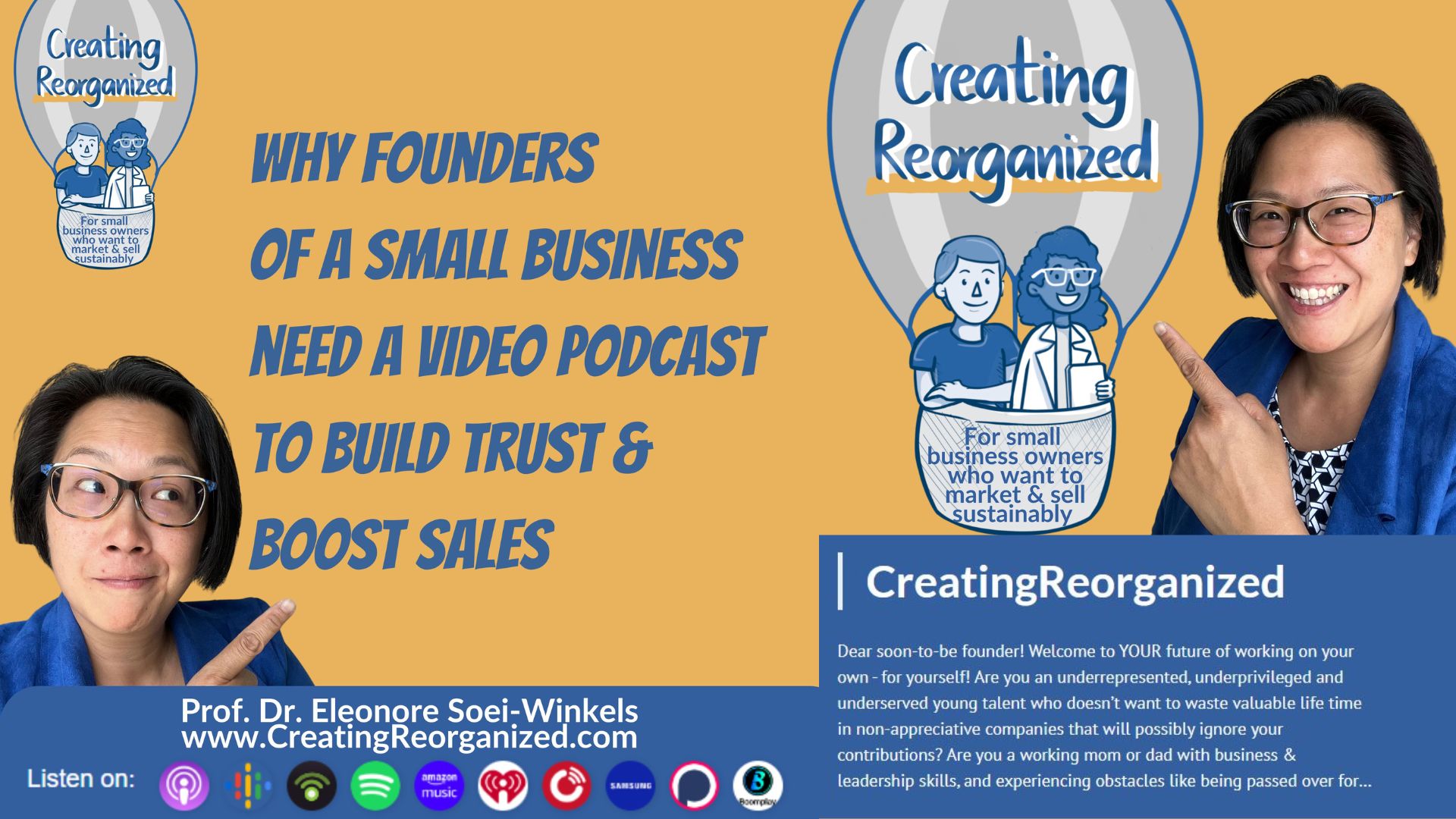
Why founders of a small business need a video podcast to build trust and boost sales, CreatingReorganized show
In this episode of CreatingReorganized show, host Prof. Dr. Eleonore Soei-Winkels provides a comprehensive guide for small business owners on leveraging video podcasts to streamline social media marketing and enhance sales. She discusses the advantages of video podcasting, including building trust and engagement with audiences, and offers practical advice for getting started. She shares insights from her own experience as the host and producer of the PostdocTransformation Show, detailing her strategies for content planning, equipment needs, and social media promotion. The episode emphasizes the importance of using AI-infused tools for efficient content creation and outlines steps for monetizing podcasts. You will also learn about the value of community feedback and goal setting to continually improve podcast strategy.
If you are a new or aspiring founder of your small business and have no time to waste, or really struggle to do your social media marketing, you will enjoy our #CreatingReorganized show!
In my day job as a psychology professor I teach my bachelor and master students in real life, how to reorganize processes in a goal-directed and future-proof way in companies. That’s what I had done for a living as a former IT strategy consultant.
For my own career coaching business on the side, I can only dedicate a fraction of my time – because I prioritize care work for my little children. I face the same or similar challenges like all small business owners. So, I applied all my experience and knowledge to create my other video podcast #PostdocTransformation to streamline my social media marketing and to boost sales of my coaching, e-courses and affiliate products or services.
I strategically capitalize on professional tools to scale my impact according to my vision of life.
Listen and subscribe to this #CreatingReorganized show, so you will learn to do the same for your own business, to build the know, like and trust factor and to boost sales of your services or products!
Please also ask your business-specific questions, because for season 2, I envision interview episodes with aspiring and new founders like you, if you want to get your #CreatingReorganized according to your vision of life!
Hello CreatingReorganizer!
Welcome to our Video Podcast “CreatingReorganized”, where we help new or aspiring founders of a small business like you streamline your social media marketing efforts and boost sales through the power of podcasting!
I’m your host, Prof. Dr. Eleonore Soei-Winkels, and I’m thrilled to share insights today on why starting a video podcast like this is not just a trendy move but a smart strategy for building trust with your audience and enhancing your sales.
Now, I know that as a budding small business owner, you may already feel overwhelmed with your marketing, especially when it comes to social media. But social media is extremely valuable for building authentic relationships and communicating with your online audience. It establishes trust, loyalty, and engagement. It helps promote your company’s products or services like e-courses or key note speaking gigs in a tangible and effective way.
That being said, if time is your rarest resource, posting consistently can be tough, and the thought of adding yet another platform to your plate may seem daunting. But trust me, integrating a video podcast can simplify and amplify your marketing in ways you might not expect. If you do it strategically like me, you will have countless social media assets to post during your vacation, across many time zones or on many social media platforms.
Why you can trust me? Well, as a psychology professor, since over 10 years I teach my students in real life, how to streamline organizational processes in companies, and that I actually had done as a former IT strategy consultant at Accenture, the top global management consulting company.
For my own career coaching business, I face the same challenges like all small business owners. So, I applied all my experience and knowledge to create my other video podcast #PostdocTransformation to streamline my social media marketing efforts and boost sales of my coaching, e-courses and affiliate products or services.
I started in January 2023, have strategically created over 60 evergreen valuable, shareworthy but also promotional episodes across 5 seasons, raised global and niched brand awareness and authority via over 9000 listenings.
Our SpotifyWrapped for 2024 reveals that we were able to win 88% new listeners and that my podcaster persona is Storyteller, which is key to attract leads, build my know-like and trust factor and to convert them into customers at the bottom of my funnel!


But without my tech stack underneath, I would not be able to strategically conduct my top-of-funnel marketing on all my social media channels 24/7/365 to serve my global audience.
Best of all, I have derived almost effortlessly countless social media content, that I can repurpose all year every day on many social media platforms. I escaped the social media content creation hamster wheel, which is key for my life as a working mom who wants to work only part-time to be a present mom for my young children. And maybe you want that for yourself in your future, too?
And by the way, if you want to become a sustainable (side) business owner as a runway for your better future, ask yourself our critical questions to vet your business idea, target audience, delivery model, pricing etc., as linked in the show notes.
At the end of this episode, I will wrap everything up from a psychological method, theory or concept, so stay until the end of this episode. Especially, if you are my bachelor or master student in real life, I would love for you to take notes and maybe even already recognize my arguments.
Let’s go!
The Benefits of Video Podcasting
Let’s talk about the benefits of video podcasting. First and foremost, video builds trust. People are more likely to engage with real human visual content than text alone. When you speak directly to your audience through video, they can see your authenticity, your passion, and your commitment to your business.
Here’s your prompt to reflect: Think about the last time you felt a connection with a brand. What made you feel that way? Was it their storytelling, their visuals, or perhaps the person behind the brand?
Another benefit is that a video podcast allows for greater engagement. You can showcase your products or services live, demonstrating their use, answering questions in real time, and creating a sense of community. It’s like having a conversation with your audience rather than just talking at them.
Now, let’s discuss some actionable steps you can take to get started with your video podcast.
Choose Your Format:
Will you be doing solo episodes, interviews, or product demonstrations? Defining this early will help shape your content.
And here’s a peek behind the scenes into my other video podcast: When I look at my own PostdocTransformation show statistics, I am really happy, that I strategically created the first 22 episodes as foundational solo episodes, which are evergreen for scientists leaping into business. I’ve built my personal brand while learning the ins and outs of podcasting. But I grew bored talking solo and I wanted my diverse audience from all over the world to have relatable diverse role models. So, I started to interview senior business leaders with a doctor title who I admire. But depending on their high or low affinity to promote their interviews on social media, we were able to reach more or less new audiences. And just because my audience has grown to like me, they don’t necessarily embrace my guests - unknown to them - from one guest to another as the overall theme “FutureOfWork in various industries” was not as strong as I anticipated. So, my retention rate dropped.
To counter act, I injected a solo episode in the start, middle and end of season 2-4. That worked better but also not I was still not reaching my goal. As I wanted to finish stronger in season 5 (autumn 2024), my own bachelor students in real life encouraged me to test 5 solo episodes as a mini-series and I will link to these 5 in the show notes as they are a great case study for dovetailing between episodes in a mini-series. With that, I was able to reach a new audience and retained my audience to finish strong in 2024. So, for me personally, I would go forward with more solos than interviews and also make sure to strategically select my guests having my audience in mind.
For your own business, there is another type of episode really valuable: As a former IT strategy consultant I was often tasked to demo software and video is such a strong tool to demo product or software usage and experience, so if you can include that in your podcasting strategy, it’s worth the extra effort and we will surely dedicate an episode on why, what and how to demo your product or service in your video podcast. But that’s rather for later, once you have built the know, like and trust factor with your audience.
So, taken together, for starting out with your video podcast, create more solo than interview episodes and build in product or service demos in your solo episodes later down the road.
Plan your content creation according to your availability
Create a content creation calendar. You might be wondering, "How will I find the time?" I hear you! As a professor and a mom, I am very strategic with my scheduling: After I have booked family vacation, noted down school-free days, I plan my podcast season schedule yearly in October for the next year.
For every half year, I note down my teaching duties, and then I note down one focus day to plan the 10 episodes for the next season and many focus days to write the scripts and record per episode. I write 3 scripts before I schedule a batch recording day, where I record up to 3 episodes within 6 hours during quieter times my lecturing schedule or while my kids are at school.
Across the next weeks, as needed and usually with 2 weeks being ahead of the publishing date to allow buffer time for sickness etc., I edit the recordings early in the mornings, while everyone in my family is asleep or at school, and derive social media assets from finished episodes in my car when my kids are engaged in their weekly hobbies.
I pay for AI-infused software in almost every process of my podcasting, and it’s worth my investment, because these professional services help me to be effective and efficient in my business.
Here’s your prompt to reflect: What times in your yearly, halfyearly, quarterly, monthly or weekly schedule could you carve out for creating your video podcast?
Invest in Basic Equipment:
You don’t need a full studio to start. In January 2023, I started with my iPhone and recorded directly in my Podbean app, the podcasting host that I still use today. Two episodes I recorded in a professional singing studio, because I recorded my jingle to celebrate 1000 listenings of my PostdocTransformation show, first aired in episode 22 (listen to it here).
Yes, I wrote and sang my own PostdocTransformation show jingle in the first 21 episodes - listen to me out of syn, LOL.
But to be honest, scheduling and going into the studio was a logistics nightmare for me as a working mom, so I ended up buying basic recording equipment.
Today I use a good microphone (e.g. I use a vocaster DM1), a webcam (I use a logitech with HD 1080), and basic lighting (a ringlight) and an audio shield to reduce the echo of my voice. I’m not their affiliate link partner, however that’s the basic equipment that suffices my quality standards, too!
What really makes a difference is the software to produce your podcast:
Trust me, if you ever interview people, you will eventually run into bad and different audio and video quality. That is a major time killer and I have a handful of recorded interviews that I can’t publish. Having the tools to save and enhance the audio quality in a video podcast is essential. You can get away with bad video, as you can enhance with B-roll or other visual content to distract, but understandably, bad audio is the top reason to stop listening to an episode despite the content quality.
So, if you want professional multitrack video and audio interviews and also solo recordings, I recommend Descript, which I have strategically selected and used since episode 23 for all my remote video interviews with guests from Asia, the US, Canada, Afrika and Europe.
Next on your list is to find an easy-to-use affordable and scalable podcast hosting and monetizing platform. Please check out Podbean, I've had great experiences with them for my other video podcast PostdocTransformation and I also host CreatingReorganized on Podbean, and they really help streamline the distribution to all major podcast players (also called directories, like Spotify, Apple, YouTube, Amazon Alexa etc. and offering and managing dynamic insertion of podcast advertisements in my current and existing podcast episodes.
As a small business owner, you don’t want to do it yourself with RSS feeds etc. With Podbean: you set and forget, what is technically needed. For setting up our CreatingReorganized show, I rediscovered, how easy it is.
P. S.:
I published first on Podbean, then toggled on Spotify, Apple podcast, YouTube and all the other podcast players. I followed their instructions, and within the next 48 hours my show appeared in their apps. It's really that easy for distributing your video podcast to maximize reach.
Once you have published your episode on your podcast host, like Podbean, it automatically get’s pushed to the selected major podcast players. But new leads won’t find your podcast just because it is available. You must promote your episodes on social media to reach new audiences: However, on social media, people scroll to be passively entertained on the surface.
Do not expect them to listen to your in-depth podcast episode instead of being entertained by 3 second short-form funny videos. Instead, create enticing teaser content that informs your non-following viewers where to find your podcast. Of course, you can set-up your podcast link in the bio or profile of your social media handle, but I would also inform on screen and in the caption about where to find your podcast.
So, for that teaser content, I recommend to derive social clips or carousel posts – and you can use AI-infused software for finding good clips, too! I use Descript to clip out my teaser content, and I get at least 7-21 short clips out of 1 hr podcast episodes. All of these you can then schedule to be published in the week of that podcast episode or all around the year – if it’s evergreen.
Schedule and post on social media platforms – mix the ones with a long and short-shelf life, which ones reach a cold vs. warm audience, focusing on the ones, where your ideal client avatar hangs out the most etc. That’s fairly easy with a social media management app like Metricool, the tool we use in our business.
Check out, how we do it as @PostdocTransformation on LinkedIn, TikTok and Instagram.
Also on Pinterest for longer shelf-life of your repurposed social media clips!
Build and nurture your own email list
As a business owner, you probably already have a website and email list provider, but if not, I can highly recommend ActiveCampaign. Building your email list is key for your business, as this is your bottom of the funnel, where the primary focus is on converting leads into paying customers. In your emails you serve and qualify your leads and offer more help with your paid products or services.
I have created an automated email course for career transition made simple, so that I automatically nurture my leads across 10 emails. By the time they reach the last email, they have learned a ton of career transition insights for free and they are either ready to buy my services or not. If they still don’t buy, they are parked on a separate list.
And don’t forget to engage with your audience by asking for feedback on what they want to hear next in your podcast (for example with TypeForm)!
If you are curious how we brand our customized feedback survey rather at the bottom of our funnel to engage our loyal podcast fans, you will find our two flagship lead magnets linked in the show notes.
We also use a quiz, made in Typeform, as a top-of-funnel lead magnet, so this is a tool for all stages in your marketing funnel.
Attention: Do not enter your email address here, unless you are also a scientist leaping into businss, LOL. This is really our flagship lead magnet for our PostdocTransformation show.
Now, let’s address the elephant in the room—challenges. You might think, “I don’t have time for this extra marketing effort, I need to run my business and serve my existing clients.”
True - for now. And I am glad that you have already a viable business with clients, but what if sales with your existing clients stagnates or ceases? What is your lead pipeline? How do you nurture them to convert them into future clients? How can you serve your existing clients generously and at the same time find out via natural feedback loops in every episode about new pain points, for which you can create new services?
As a professor teaching how to reorganize business processes I recommend reevaluating the current business model in good times – not when you need to make money urgently. Then you have enough budget to double down on what’s working in a goal-directed way. Usually, companies turn to strategy consultants, when it’s unevitable or too late.
Also, to be honest and as a storyteller according to our SpotifyWrapped2024, it’s an even more compelling story to share positive current and progressing customer stories in your podcast.
So, there is no better time than NOW. And if you don’t have a viable business idea yet, remember to ask yourself our critical questions to vet your business idea, target audience, delivery model, pricing etc, if you want to become a sustainable (side) business owner as a runway for your better future. You can find our free quiz as below (and of course made in Typeform):
And by the way, I created my own e-courses on Thinkific using exactly this approach: I listened to my existing clients’ pain points and then created my service. Or you do that like me, I sketch out a new e-course, promote it to early birds for a reduced price and then, if the demand is really on my bank account, I build out the full e-course, powered by the early birds. In the next launch, I sell the proven e-course for a higher ticket. So, if you also have a knowledge based business idea, the learning management software Thinkific can be valuable for you.
You could also ask yourself “What if no one listens to my video podcast?”
Well, I want to assure you that starting small is key. You don’t have to launch a full season of ten or more episodes overnight. Start with 3 episodes to test the water. Only publish them, one by one or at once, if you have finished your 3 episodes ready to be published in the next week or month.
Trust me, as a mom of small children I am often sick and in my second episode of my PostdocTransformation show, I had to turn to my old YouTube video to edit, and publish because I had not recorded my next episode due to my sore throat. Avoid sweating like me back then and prepare a buffer of ready-to-be published episodes before launching your video podcast or starting your next season.
And if you’re worried about not having a huge audience initially, remember that every great podcast started with just a few listeners. Like I already said, it can be a great opportunity for you to serve current and rekindle previous clients.
If you do what I teach you, you can leverage and reach new social media followers who you can win to become leads and eventually new clients. Due to the evergreen nature of your video podcast, you are playing a long-term game.
What fears are holding you back from starting your video podcast?
Is it the video component and feeling unnatural looking into the camera? Start with audio only and learn how to add video components to your social media assets. You don’t like your voice? Use voice actors or AI voice, but I would encourage you to embrace your voice as one key element of your personal brand.
Is it content strategy? You can study my episode list as a blue print for your own podcast episode list. In a later episode, I will propose episode lists for starting various business promotional podcasts, so subscribe to our #CreatingReorganized show to not miss that our upcoming good stuff.
Do you fear using the AI technology? You can use old-school podcasting tools. You fear using tech in general? You can outsource the production after recording. What else do you fear?
Write down your fears, and consider how you can turn each fear into a plan of action, so you can build and future-proof your business! If you need support, DM us and we will gladly serve and answer all your questions in future episodes.
Let’s take a moment to reflect on my own journey. Since launching The PostdocTransformation Show back in January 2023, I’ve produced 60 episodes and engaged with an incredible international audience of scientists transitioning into business.
I’ve learned that by sharing my personal experiences, challenges, and victories, my audience feels more connected to me. They appreciate the authenticity and find value in the behind-the-scenes stories I share, whether it’s about balancing my responsibilities as a part-time professor or being a devoted mom.
I used to have impact in my classroom with my bachelor and master students or, for my own business, in career transition workshops at universities and graduate schools with their scientists. But in the era of Covid-19, my business model died and I had to reorganize my work. I discovered that I can inspire, motivate, and lead online via videoconference, too. And as a former IT strategy consultant, I am all about scaling my business using technology and recently AI.
So, I created my video podcast PostdocTransformation show and you can see my work on LinkedIn, YouTube, Spotify, Instagram and TikTok etc. I really walk my talk and I want you to benefit from what I have learned so far and what I will learn in the future.
Find a community of business podcasters
Community is another significant aspect. Podcasting can be daunting, and joining podcasting groups or forums can provide support and inspiration as you embark on this journey. Most probably, you don’t have time for that, so as you are listening to me, this can be a great start to feel encouraged, DM me, so I can cheer you on building and future-proofing your business with your video podcast. Especially if I convince you to click and buy my affiliate software recommendations, reach out to me, so you can shadow me while I produce my real episodes for CreatingReorganized or PostdocTransformation. I also offer podcasting business internships for anyone who wants to learn from me.
Later down the road and really powerful is to think from a supply chain perspective. Who can be a great interview guest or fellow business podcaster to collaborate BECAUSE you both provide a natural product or service ladder, valuable for both of your audiences?
An applicable model, theory or concept from my psychology lectures (see my lecture script):
Goal-setting by Locke & Latham (1984)
So, as promised at the beginning of this episode, let’s wrap everything up from a psychological method, theory or concept. If you are my bachelor or master student in real life, comment in your podcast player, which psychological models, theories or concepts would have also applied.
So, according to Locke & Latham’s goal-setting theory, goals need to be clear and concise to be motivating. Choose your primary key performance indicators to track your goal-directed progress. Checking in regularly with your stats from your podcasting host like Podbean or within Spotify, YouTube Studio etc. is motivating as you can see results and can counter-act or double down as necessary.
For example, SpotifyWrap is a huge shareworthy celebration in the world of podcasting and in their visualization of your podcast statistics for the last year, they also reveal the episode spotify link that was shared most from one listener to another, how many local fans you have and what your podcaster persona is. These are KPIs that help you find a new ideal customer avatar as that person usually discovers your podcast and listens to many episodes beyond the one that was shared initially.
In our context, we can say that your goal as an aspiring small business owner is to build trust and brand awareness, as a small business owner with existing products and services you may want to boost initial sales from your ideal customer avatars, also called leads. Or if you are already longer in business, you may also want to sell across a value ladder to your existing customers.
So, here’s my prompt for you: What is your specific motivating challenging, yet doable goal?
Depending on your specific goal, you select your key performance indicator. And then you can hypothesize in the direction towards your goal: The more you do this (that is the independent variable) in a measurable way within a set and comparable time frame, the better the key performance indicator (that’s the dependent variable or result). Keep in mind, that KPIs as for brand awareness may change directly, while KPIs like sales may take longer.
So, here’s my prompt for you: What is your goal-directed hypothesis with your independent and dependent variables?
Depending on where you are in your business life cycle, you should specify your goal to be just a little bit beyond your comfort zone, so you must stretch, but it’s doable for you. And this is why I shout out the podcasting service providers I pay myself.
I could also keep my business secrets for myself, but instead after using them for up to 2 years as a podcaster, I recommend their services openly and of course earn a small commission if you become their customer. My goal is to empower you to create a business promotional podcast capitalizing on technology. Creating a podcast has become a doable challenge with the rise of AI within the podcasting services.
So, here’s my prompt for you: Provided that you want to reach your goal with podcasting, do you want to make it easier for you using future-proof podcasting technology? All of the services I mention offer a free test period, so when you use my affiliate links, you can test them for free and only if you become their customer, I earn a small commission.
So, with this podcast CreatingReorganized, you get the strategic framework that I have developed as a psychologist, IT strategy consultant and podcaster, small business owner and mom for free. The podcasting services providers get the advertisement for free and I only reap what I sow now with and for you, if you become their customer. This tells you how much I believe in podcasting for my own business. But now back to you!
According to Locke and Latham, you should commit yourself to working towards your goals. That commitment is easiest when you define them for your own business, and you set yourself a limited doable time frame like a season of 10 or 12 weekly episodes. That equals roughly 3 months of publishing episodes, so you can track your progress and get better in creating your script, recording, producing and promoting your episodes. And after a season you can have a season break to analyze your KPIs, so that you can determine, whether your hypothesis has been confirmed or not. And for your next season you can double down on what has worked out and let go of what was unsuccessful. In the season breaks you can rest by posting on social media based on your episodes, but without the hard work to create etc. What I do in that time is to mainly focus on other areas of my business, and to be honest, I align my podcasting season breaks with major school holiday seasons for maximum rest. You sow during the season and reap during the break.
Remember that I suggested earlier to get your podcast listener’s feedback to understand their further pain points and to ask them to subscribe and provide feedback for your episodes? This conscious reaping and feedback collection is important for your self-efficacy and your motivation to continue with continued or refined goals and hypotheses for the next season.
Taken together: starting a video podcast can be a game-changer for your small business. It builds trust, engages your audience with streamlined sustainable content creation. And that can drive sales while you are present with your loved ones and live your life or focus on serving your existing and new clients.
I encourage you to take that first step today! Remember, you don’t have to do it all at once. Start small, stay consistent, and watch how your podcast transforms your business.
And before we go, if you’re ready to dive in and start your podcast journey, I highly recommend checking out the tools I mentioned earlier (and described from a meta level in detail below)—
Podbean,
Descript,
Typeform,
ActiveCampaign,
Thinkific and
Metricool.
Each of these services has made my podcasting business experience smoother and more efficient, and I trust, that they can help you, too!
Thank you for listening to CreatingReorganized! If you found this episode helpful, please subscribe, share it with a business friend, and leave a review on your favorite podcast player. Your feedback helps me as a small business owner to serve more small business owners for free, so thank you and
Happy CreatingReorganized—according to your vision of life!
Cheers, Eleonore & Team PostdocTransformation & CreatingReorganized
